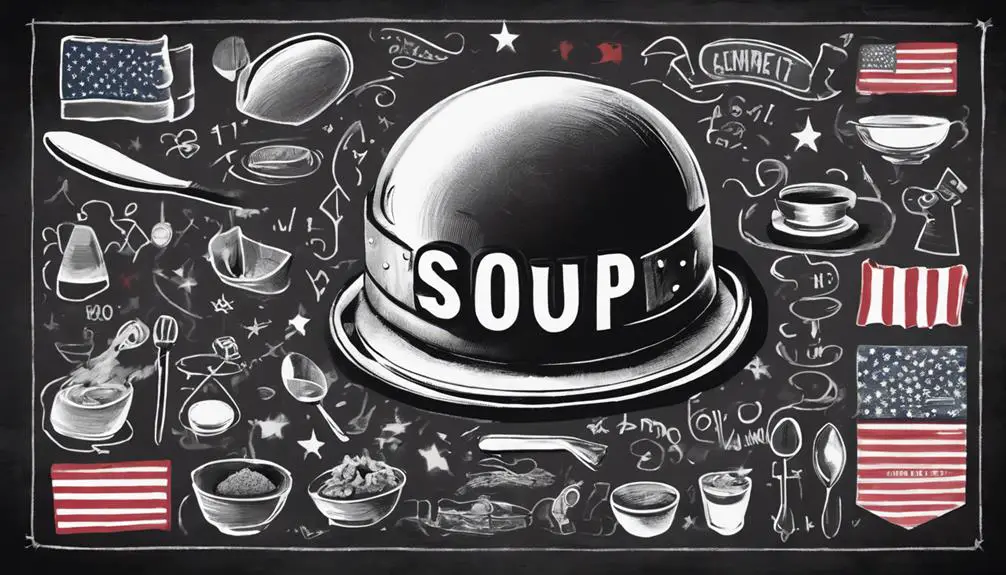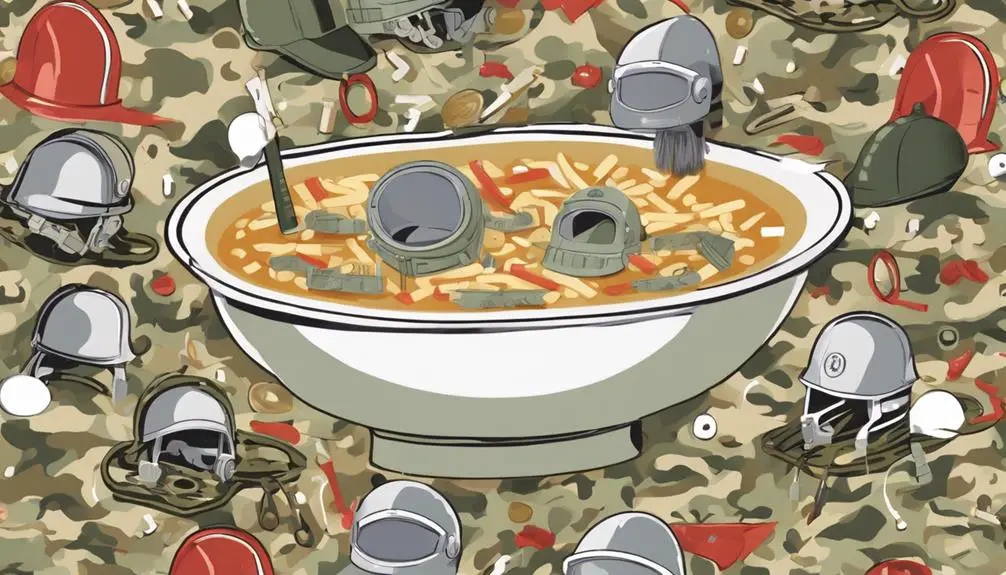You're about to enter a world of abbreviations, acronyms, and slang that'll make your head spin. The US military relies on this 'alphabet soup' to convey complex info quickly and efficiently. From SITREP (situation report) to OP (operation), understanding these abbreviations is essential for effective communication. You'll need to decode unfamiliar acronyms, recognize common prefixes and suffixes, and pay attention to context clues. As you navigate this world of military slang, you'll discover branch-specific terminology, master shorthand, and develop a military mindset that'll help you stay focused on the mission. And that's just the beginning of your journey into the world of military lingo.
Decoding Acronyms 101

When you're new to the military, figuring out the alphabet soup of acronyms can be overwhelming, but understanding the basics of decoding them is important to effective communication.
To start, it's essential to understand the origins of acronyms. Most military acronyms are derived from abbreviating phrases or words, often to simplify complex terminology. For instance, 'SITREP' comes from 'situation report.' Knowing this, you can begin to decipher unfamiliar acronyms by breaking them down into individual words.
Codebreaker techniques can also aid in decoding acronyms. One technique is to identify common prefixes or suffixes, such as 'OP' for 'operation' or 'COM' for 'command.' You can also look for patterns, like the use of the first letter of each word in a phrase. Additionally, paying attention to context clues, such as the branch of service or department using the acronym, can provide valuable insights.
Military Lingo Essentials
Now that you've cracked the code of military acronyms, it's time to master the everyday lingo that's unique to the military culture. Military lingo essentials are more than just a collection of cool slang phrases – they're an integral part of the military's communication fabric.
To navigate this world effectively, you need to understand the nuances of military etiquette. This includes knowing when to use formal titles, such as 'sir' or 'ma'am,' and when to use more informal language.
Effective communication is critical in high-stress military environments, and understanding military lingo essentials helps break down communication barriers. You'll need to learn how to give and receive clear, concise orders, as well as how to ask questions without appearing uncertain.
Mastering military lingo essentials will help you build trust with your comrades and demonstrate your professionalism. By doing so, you'll become a more effective team player and a valuable asset to your unit.
Common Abbreviations Explained

You'll frequently encounter a multitude of abbreviations in military communication, and understanding their meanings is essential for effective collaboration and decision-making. These abbreviations, often referred to as acronyms, are an integral part of military jargon. They've evolved over time, originating from the need for brevity and efficiency in communication. The acronym origins can be traced back to the early days of military communication, where operators had to convey complex information quickly and accurately.
As military jargon evolved, so did the use of abbreviations. They were initially used to simplify complex terms, making it easier for personnel to communicate quickly and efficiently. Over time, these abbreviations became an integral part of military culture, with new ones being added and old ones being modified to adapt to changing circumstances.
Understanding these abbreviations is essential, as they convey critical information in a concise manner. In the military, clarity and precision are paramount, and abbreviations play an important role in achieving that. By familiarizing yourself with common abbreviations, you'll be better equipped to navigate military communication and make informed decisions.
Branch-Specific Slang Decoded
As you navigate the complex landscape of military communication, you'll find that each branch has its unique slang, shaped by its distinct culture and history. This branch-specific lingo is a reflection of the unique experiences, values, and traditions of each service.
For instance, in the Marine Corps, you'll encounter 'Marine Manners,' a code of conduct that emphasizes discipline, respect, and camaraderie. This slang is deeply rooted in the Corps' proud history and esprit de corps.
On the other hand, the Navy has its own set of 'Navy Nicknames' for its ships, aircraft, and equipment. These nicknames often reflect the vessel's characteristics, capabilities, or operational history.
Understanding these branch-specific slang terms is essential for effective communication and building relationships within each branch. By recognizing and using these terms, you'll demonstrate your familiarity with the branch's culture and values, fostering a sense of belonging and facilitating collaboration.
Mastering Military Shorthand

Master military shorthand by deciphering abbreviations, acronyms, and alphanumeric codes that serve as a linguistic shorthand, allowing personnel to convey complex information quickly and efficiently. You'll need to develop a military mindset to navigate the complexities of military communication. Effective communication is vital in high-stress environments, and mastering shorthand is essential to overcome communication challenges.
| Shorthand | Meaning |
|---|---|
| CO | Commanding Officer |
| NCO | Non-Commissioned Officer |
| SOP | Standard Operating Procedure |
| EOD | Explosive Ordnance Disposal |
| ETA | Estimated Time of Arrival |
As you become more familiar with military shorthand, you'll be able to quickly convey critical information, such as reporting for duty (RD) or going on leave (LEAVE). Mastering this shorthand will help you stay focused on the mission, rather than getting bogged down in communication challenges. By adopting a military mindset, you'll be able to think on your feet and communicate efficiently, even in high-pressure situations.
Frequently Asked Questions
Are There Any Military Slang Terms That Are Considered Offensive?
When exploring military slang, you'll find that some terms can be considered offensive. Derogatory terms, often born from cultural insensitivity, can perpetuate stereotypes and racism.
As you investigate further, you'll discover that these terms can be rooted in historical biases and prejudices. It's crucial to approach these terms with cultural sensitivity, recognizing their harmful impact on marginalized groups.
Can Military Slang Be Used in Formal Military Communications?
Imagine yourself standing at attention, surrounded by crisp uniforms and stern faces. In this formal setting, you'll rarely hear military slang.
When it comes to formal military communications, you'll stick to a formal tone and official protocol. You won't find colloquialisms or slang in official reports or briefings. The language is precise, professional, and polished.
It's not about being stuffy, but about maintaining respect and clarity. So, while slang might be okay in casual conversations, it's not welcome in formal military communications.
Are Military Slang Terms Universal Across All Branches?
As you explore the world of military slang, you'll find that terms aren't universally accepted across all branches. Branch variations play a significant role in shaping slang, with each branch developing its own unique terminology.
Slang evolution also contributes to the differences, as terms can emerge, adapt, or fall out of use over time.
Is Military Slang Only Used for Communication Purposes?
When you think about it, military slang serves purposes beyond just communication. It holds cultural significance, reflecting the values and identity of the military community.
In its historical context, slang has been used to build camaraderie, create a sense of belonging, and even as a form of social commentary.
It's not just about conveying information; it's about shared experiences, inside jokes, and a unique cultural language that sets the military apart.
Can Civilians Use Military Slang in Everyday Conversation?
Imagine walking into a coffee shop, ordering a 'latte' in a tone that screams 'HOOAH!' – you'd stick out like a sore thumb.
Using military slang in everyday conversation can be seen as cultural appropriation, where you're borrowing from a distinct social identity without truly understanding its context.
Be honest, are you genuinely part of the military community, or are you just trying to sound cool?
Conclusion
You've mastered the art of deciphering military slang, but you might be thinking, 'What's the point of learning all these acronyms and abbreviations?'
The answer lies in the ability to communicate efficiently and effectively in high-stress situations. By speaking the language, you'll gain a deeper understanding of military culture and operations, ultimately saving time and lives.
Now, put your newfound skills to the test and stay ahead of the curve in the world of military communications.







